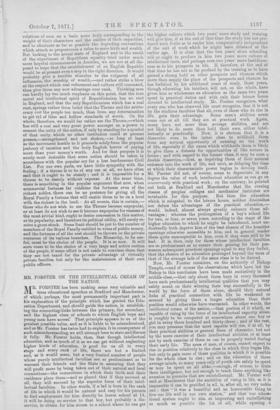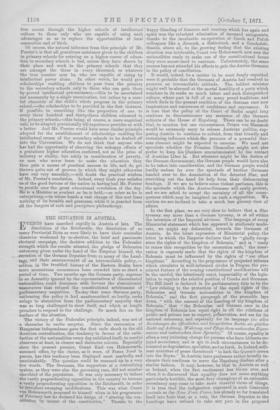MR. FORSTER ON THE INTELLECTUAL CREAM OF THE NATION.
MR. FORSTER has been making some very valuable and terse educational speeches at Bradford and Manchester, of which, perhaps, the most permanently important part is his explanation of the principle which has guided the Edu- cation Department, and should guide the nation, in establish- ing the connecting-links between the primary, the secondary, and the highest class of schools to which English boys and young men have access: That principle appears to us of the greatest possible value, and as it is liable to be misunderstood, and as Mr. Forster has twice had to explain it in consequence of such misunderstanding, we will attempt here to state and discuss it fully. Mr. Forster holds, then, that though intellectual education, and as much of it as we can get without neglecting higher kinds of education, is good for us all in every stage and every rank of life, there are but a limited and, as it would seem, but a very limited number of people whose purely intellectual faculties are so predominant as to warrant their friends and the State in assuming that they will profit more by being taken out of their natural and local connections—the connections in which their birth and their residence place them—and so placed that if they succeed at all, they will succeed by the superior force of their intel- lectual faculties. In other words, if a lad is born in the rank of life in which it would be natural and easy for his parents to find employment for him directly he leaves school at 14, it will be doing no service to that boy, but probably a dis- service, to obtain for him access to a school where he can get
the higher culture which two years' more study and training will give him, if at the end of that time the study has not pro- duced such fruits as to render him comparatively independent of the sort of work which he might have obtained at the earlier age. It is clear that the two years' More schooling will or ought to produce in him two years' more culture of intellectual taste, and perhaps oven two years' more fastidious- ness as to his prospects in life. If, therefore, at the end of that time lie has not so far profited by the training as to have gained a strong hold on other prospects and chances which more than supply the place of the prospects and chances he has forfeited by his additional years of study, those years, though educating his intellect, will not, on the whole, have given him so wholesome an education as the same two years spent in practical duties and with only their leisure hours devoted to intellectual study. Mr. Forster recognizes, what every one who has observed life must recognize, that it is not by the studious faculties that all, even of those who do rise in life, gain their advantage. Some men's abilities never come out at all till they are at practical work. Again, many have not more than average abilities, and are not likely to do more than hold their own, either intel-
lectually or practically. Now, it is obvious that it is a disservice even to the latter class to withhold them from any natural opportunity of entering on the work of life, especially if the cause which withholds them is likely to give them a distaste for opportunities of like nature in future ; and with regard to the former class, it may be even a double disservice,—first, as depriving them of their natural entrance into the work of life, and next, as delaying the time at which their characteristic power begins to develop itself. Mr. Forster did not, of course, mean to depreciate in any degree the value of such intellectual education as can go on concurrently with practical work ; on the contrary, he pointed out both at Bradford and Manchester that the evening classes of peoples' colleges and mechanics' institutes are
invaluable for this purpose. But then the education which is relegated to the leisure hours, neither diminishes nor defers the advantages of the practical education,— would, indeed, almost always greatly enhance those ad- vantages ; whereas the prolongation of a boy's school life for two, or four, or seven years, according to the stage of the higher education to which he might be introduced, must un- doubtedly both deprive him of the best chance of the humbler openings otherwise accessible to him, and in general render them quite unacceptable to him, even if they were still to be had. It is, then, only for those whose intellectual faculties are so predominant as to ensure their gaining for their pos- sessors subsequent practical openings equal to any they forfeit, that the chance of an education prolonged beyond the term of that of the average lads of the same class is to be desired.
Now, Mr. Forster considers, on the authority of Bishop. Temple,—and of course the observations which have led the Bishop to this conclusion have been made exclusively in the middle-elass,—that only about three boys in every thousand have such predominantly intellectual qualities that you may safely count on their winning their way successfully in the world by the force of these alone, should their natural links of practical connection with life be weakened or severed by giving them a longer education than their position would otherwise have warranted. In other words, the intellectual cream of the nation,—that portion of it which, as capable of rising by the force of its intellectual capacity alone, is roughly to be computed at somewhere about one boy or girl in every three hundred and thirty-three ; and of the rest, you may presume that the most capable will rise, if at all, by their practical abilities or general force of character, but not by the mere exercise of their intellectual abilities, or at least not by such exercise of them as can be properly tested during their early life. The mass of men, of course, cannot expect to rise in position relatively to the class in which they began life, but only to gain more of those qualities in which it is possible for the whole class to rise ; and on the education of these average minds, so many years only of youth can safely be spent as may be spent on all alike,—enough, of course, to train their intelligence, but not enough to teach them anything like aversion to pursuits that are unintellectual. Mr. Forster well said at Manchester that the ambition of rising in life, as it is impossible it can be gratified in all, is, after all, no very noble one ; that "it was a beautiful and an honourable thing to live our life well in our own station," and that our educa- tional system ought to aim at improving and embellishing as much as possible the lot of all, while opening a
free ascent through the higher schools of intellectual culture to those only who are capable of using such advantages so as to replace the opportunities of local connection and of birth.
Of course, the natural inference from this principle of Mr. Forster's is that all gratuitous assistance given to the children in primary schools for eutering on a higher course of educa- tion in secondary schools is had, unless they have shown by their place and work in the primary schools that they are amongst the three in every thousand, or whatever the true number may be, who are capable of rising by intellectual power alone. In other words, he would give scholarships enabling children to pass from the primary to the secondary schools only to those who can gain them by proved intellectual pre-eminence,--this to be ascertained not necessarily by a single examination, but rather by a care, ful chronicle of the child's whole progress in the primary school,—the scholarships to be provided in the first instance, if possible, in something like the proportion of one to every three hundred and thirty-three children educated in the primary school,—this being, of course, a mere empirical rule, to be adapted provisionally till experience provides us with a better. And Mr. Forster would have some similar principle adopted for the establishment of scholarships enabling the intellectual cream of the secondary schools to be drafted off into the Universities. We do not think that anyone who has had the opportunity of observing the unhappy effects of a gratuitous higher education conferred, not as the prize of industry or ability, but solely in consideration of poverty, on men who never learn to make the education they thus gain a means of practical success in life, and do get thrown quite out of grooves in which they might otherwise have run very smoothly,—will doubt the practical wisdom of Mr. Forster's conclusion. Indeed, every fresh year satisfies us of the good fortune of the nation in having had Mr. Forster to preside over the great educational revolution of the day. He is a Minister as prudent as he is bold,—as sober as he is enterprising,—in whose hands a vast change of this sort loses nothing of its breadth and greatness, while it is guarded from all the dangers of rash and precipitate philanthropy.



































 Previous page
Previous page